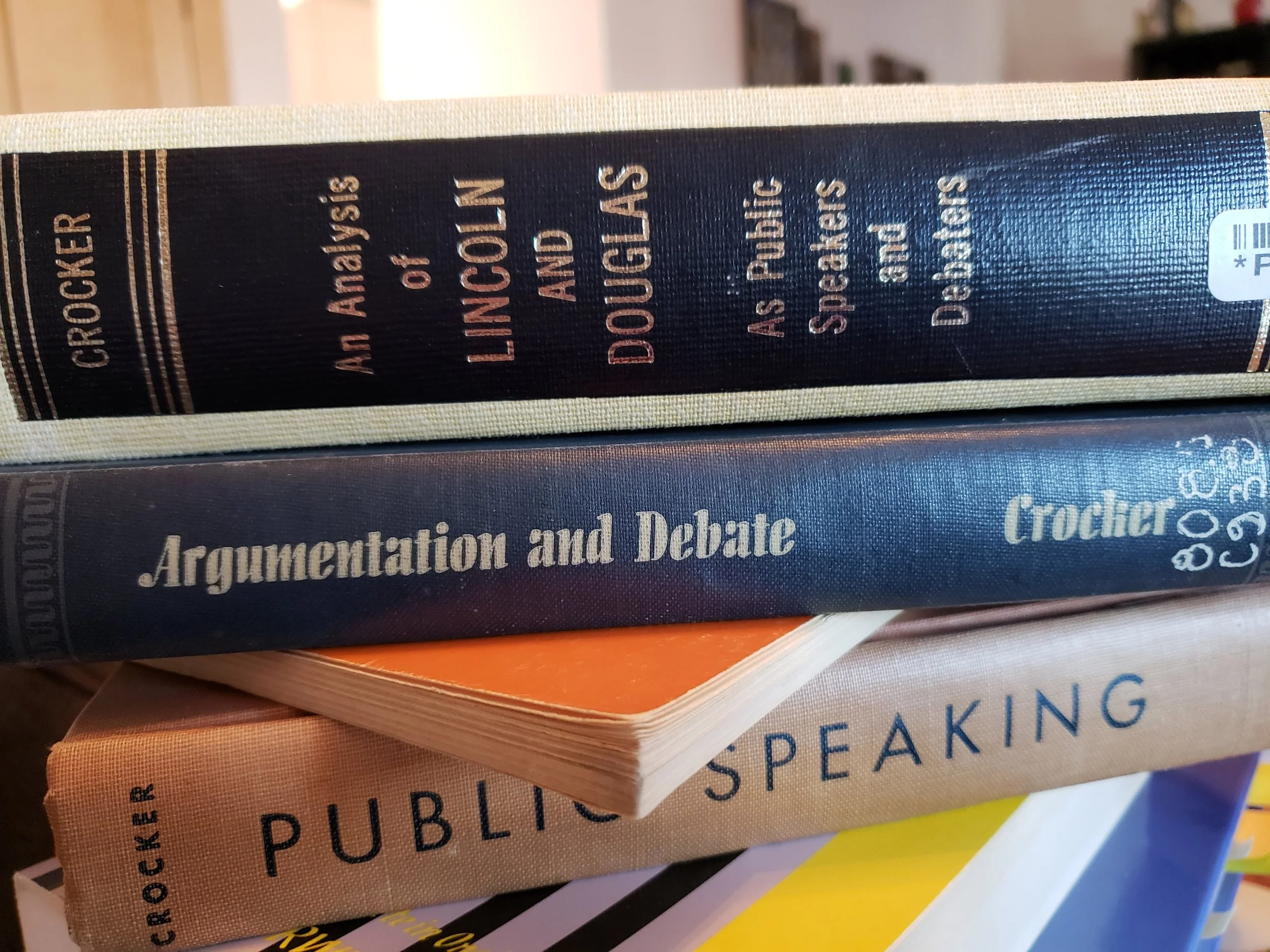
books by Professor Lionel Crocker, Ph.D.
There was a time when professors of speech were proud to be called professors of speech and wrote a dizzying array of analytical texts, dancing the rhetorical line of textbook and study. What happened?
Professors of speech were proud to teach students about orators and oration, and proud to encourage them to speak up and out, to give oral presentations in class. Now it seems mostly what we do is grade poorly written papers of half-assed explanations of French critical theory. It’s half-assed, because it’s borrowed. It’s not ours. We are embarrassed of what we own, we want to pretend it’s not ours. We want to own something cooler. We are anxious about being “mere” speech teachers.
I really miss The Journal of the American Forensic Association because it was an example of what we aspired to be and what we gave up on. I don’t have actual nostalgia because I’m not old enough to have professionally interacted with the journal before it was transformed into the much cooler, but not quite French Argumentation and Advocacy. The shift in content is palpable if you look through the legacy of JAFA. Gone are the concerned pieces about doing right by students. Present are a lot of essays that claim to have “figured out what really happened” in a public controversy that is over 3 or 4 years old. I prefer and miss the accounting of teaching, the concerns about obligations, ethical and otherwise toward students who are speaking and creating rhetoric, and the concern about evaluation and assessment. I don’t think that A&A, or any of our communication journals are terribly interested in these conversations. Sometimes it’s unclear to me what the Taylor and Francis journals are, except file folders for academic essays. Who goes through and reads one particular journal over another one?
I accidentally discovered Lionel Crocker and his work and it’s like a breath of fresh air, sort of like the Druidian canned air in the film Spaceballs. Crocker was a “generalists generalist” and lost nothing from it. He taught public speaking, a very problematic class worth talking about called “The Great Orators” (that would be fun to see that syllabus today), Debate and Argumentation (the way I prefer it phrased anyway) as well as other courses on politics and speech. He also regularly gave speeches himself and some were published in Vital Speeches of the Day. He was also listed in Who’s Who in the United States several times. He felt confident and comfortable teaching 7 classes and then spending the afternoon writing about whatever he felt he wanted to share scholarly opinion on.
How do we get back to this? Hyper-specialization has made us concerned about the material ownership of our teaching and research, and has made us wary of sharing ideas with others in an accessible way. Our tenure and promotion standards are based on the question, “How few people can understand your work?” And teaching is considered to be a grueling labor that one must tolerate in order to do the real work: publishing some esoteric thing in a very expensive, very pay-walled journal that many people will never see. We should question why we feel such anxiety about where we are, what we study, and why we wish it were something other than what it is. I’m not suggesting everyone abandon their research agendas. Far from it. I’m suggesting that there is an old abandoned mode of performing “rhetoric professor” that should be recovered, explored, tested, discussed, and possibly adapted for performance. Don’t young people today call this a ‘reboot’?
Concerning ourselves with the public and shared nature of oratory, concerning ourselves with the American, oratorical tradition of public speaking and public address, concerning ourselves with this as a dangerous and influential set of powerful and revolutionary ideas (which is why looking at the Great Orators course syllabus would be a class in itself on modes of exclusionary politics), thinking about rhetoric as a daily practiced lived thing among all people who argue and think and engage one another regularly is what we should turn our attention toward, scholarly and pedagogically, and realize that what we own, what our tradition is, and what we are able to teach is nothing short of subversive. In the physics lab they do not let the students actually construct nuclear bombs. If they only knew what we hand over for practice in our courses.
A few years ago I thought about writing about another of these highly influential, highly thoughtful generalists of our field who are forgotten (or ignored?) Arthur Kreuger. There are a ton of these people who should still be thought about, and potentially emulated in some respects , most notably people who want to engage the world around them with scholarship and pedagogy instead of a few hundred people who “get it.” I get so much out of looking at what they did, but I wonder what the research agenda looks like? At the last Tokyo Argumentation Conference, David Zarefsky gave a presentation on Douglas Ehninger, another of these generalist types, and how and why his research matters, or speaks to us today. Many of you know I love Ehninger, but his legacy is hardly one that needs recovery.
Who else out there do I not know about? Who might I bump into next? I can’t remember where I found out about Crocker, but I think this sort of approach to rhetoric is one that we are missing and would really, really benefit from in ways that we have forgotten about.